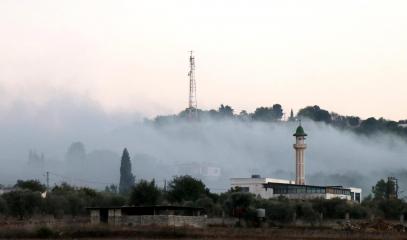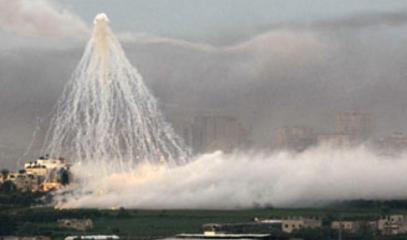Israeli ‘phosphorous’ bombing, Beirut wants to lodge a complaint with the UN
Despite denials by the Jewish State, the use in raids against Hezbollah, especially against civilian targets and farmland, has been documented by pro-human rights associations and observers on the ground. The Land of the Cedars is ready to lodge a complaint with the United Nations. Amnesty International speaks of ‘appalling’ attacks that cause serious damage to the environment.
Beirut (AsiaNews) - The International Criminal Court (ICC) has already ruled that a whole series of actions committed by the Israeli army in the context of the conflict in Gaza against Hamas can be qualified as war crimes.
Amnesty International and Human Rights Watch, along with numerous other reliable sources and groups on the ground, whether individuals or associations, who have been following the clashes between Hezbollah and the Israeli army on the southern border of Lebanon - and which have so far left 375 dead and more than 1,500 injured - have recorded hostilities that are considered, at least potentially, war crimes. These include numerous accounts of bombings of civilians, farmland and forest areas with white phosphorus munitions.
These bombardments began a few days after Operation ‘Flood of Al-Aqsa’ on 7 October and the subsequent war in support of Hamas by Hezbollah from the southern border on the following day, 8 October.
Unfortunately, the hostilities began at the height of the fruit and olive harvest season, depriving dozens of farmers of their primary resources and making some predominantly agricultural areas and regions inaccessible.
This region, with its fertile soils and ideal growing conditions, produces up to 22% of the country's fruit and citrus fruits, and 38% of its olives, according to data provided by the Lebanese Ministry of Economy. One can therefore imagine the losses for the economy and domestic production
Reduced agricultural production, infertile soils, increased risk of erosion, threats to living organisms. These are just some of the main effects of the use of white phosphorus, which are numerous and long-lasting, according to experts.
Once the substance has reached rivers and aquifers, it can affect people who drink the water. Moreover, if the water resources used for irrigation are polluted, local crops and livestock are immediately exposed to the toxicity of this chemical. Its spread can jeopardise the safety of the local food cycle. At the same time, soil decontamination is possible, but it is an arduous process with an uncertain outcome.
Affected populations
According to Amnesty International, the use of this type of rocket and ordnance against civilian targets marked the very first phase of the war between 10 and 16 October. This was followed by the bombing of the village of Dhayra on the night of 16-17 October, which was well documented by the activist organisation and the local press.
It was an indiscriminate attack that injured at least nine people and damaged civilian property. Dhayra is a Sunni village located about a hundred metres from the border. It was split in two in 1948, when the state of Israel was created: some local residents still have relatives in the village on the Israeli side, now renamed Arab Al-Aramshe.
The inhabitants of Dhayra called the night of 16-17 October the ‘black night’, with the complete evacuation of the entire area, which had previously been heavily hit by white phosphorus bombs dropped by the Israeli army, heedless of the local population. According to the mayor of the Lebanese village, Abdallah Gharib, the attacks began at around four o'clock in the afternoon on 16 October and continued late into the night.
‘A nauseating smell and a huge cloud covered the town, so much so that we could not see more than five or six metres in front of us. People started fleeing their homes in a frenzy,’ the first citizen recounted.
‘When some returned two days later, their houses were still burning. Even today, we continue to find remnants, even the size of a fist,' explained Mayor Gharib a few weeks after the bombing, “that reignite when exposed to the air,” illustrating a persistently critical situation.
Dr Haitham Nisr, an emergency room doctor at the Lebanese-Italian hospital in the Tyre region, told Amnesty International that on 16 and 17 October, medical teams treated nine people from the towns of Dhaïra, Yarine and Marwahin.
The inhabitants of the area in need of medical treatment were suffering from persistent breathing difficulties and coughing caused, in his opinion, by the inhalation of white phosphorus fumes left by the explosive devices exploded on the ground. An accusation shared and reiterated by Aya Majzoub, Amnesty International's deputy regional director for the Middle East and North Africa, according to whom ‘it is appalling that the Israeli army has used white phosphorus indiscriminately, in violation of international humanitarian law’.
Difficult to condemn
Apart from the attack on civilians, the devastation caused to vegetation and those inflicted on agricultural land are considered part of a ‘deliberate and systematic policy’ of ‘scorched earth’, as interim Environment Minister Nasser Yassine called it. For the Lebanese politician, Israel's aim was to cause damage to the environment, which is why the country of the cedars intends to file ‘a documented complaint’ against these ‘acts of aggression, prohibited by international law’. However, while there are mechanisms and safeguards in international law, they are difficult to apply in practice and it is difficult to translate them into concrete actions.
In this regard, researcher Charlotte Touzot-Fadel from the University of Limoges, who has worked in the past with the UN in southern Lebanon after the 2006 war, emphasises that ‘it is necessary to prove serious and lasting damage to the environment’.
From this perspective, the principle of ‘cumulative and irreversible’ criteria applies, which are most often ‘complicated’ to prove in legal terms. ‘The United Nations,’ she continues, ‘passed resolutions against Israel in 2006 in the wake of the oil spill, but there has been no concrete application’.
The environmental and legal expert emphasises that ‘even a symbolic condemnation would have been sufficient’ even if, despite the existing legal and regulatory provisions, environmental law ‘is only really applicable - she concludes - in peacetime’.
GATEWAY TO THE EAST IS THE ASIANEWS NEWSLETTER DEDICATED TO MIDDLE EAST. TO RECEIVE A WEEKLY UPDATE EVERY TUESDAY, CLICK HERE.










.png)










